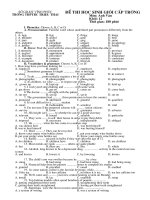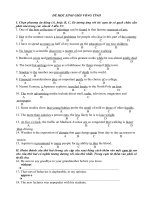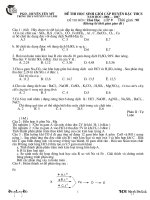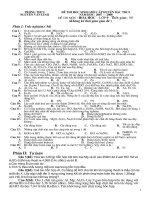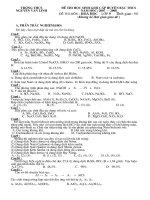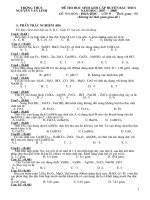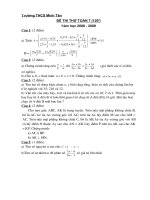Đề thi thử HSG
Bạn đang xem bản rút gọn của tài liệu. Xem và tải ngay bản đầy đủ của tài liệu tại đây (275.9 KB, 8 trang )
Sở gd - đt quảng ninh
Trờng thpt trần phú
---------------------
Kỳ thi chọn học sinh giỏi tỉnh lớp 12
Năm học 2007 - 2008
----------o0o----------
đề thi chính thức
Chữ ký của giám thị
Môn: Tiếng Anh
SBD:
Thời gian làm bài: 180 phút,
(không kể thời gian giao đề)
1.
Ngày thi: 27/07/2007 Số phách:
Họ & tên thí sinh:
Ngày sinh:
2.
Nơi sinh:
Học lớp:
Trang 1/8
Sè ph¸ch:
§iÓm bµi thi: B»ng sè: ..........................(B»ng ch÷:................................................................)
Ch÷ ký cña gi¸m kh¶o:
1: ....................................................2: ...........................................
Chó ý: ThÝ sinh tr¶ lêi ngay vµo ®Ò thi nµy. NÕu sai ph¶i g¹ch bá råi viÕt l¹i.
I. Listening: (3,5 pts)
Part 1: You will hear people talking in eight different situations. For questions 1 - 8,
choose the best answer A, B or C.
1. You hear a critic describing a film. What is his opinion of it ?
A. It is dull B. It will shock C. It is peculiar
2. You hear someone talking on a radio phone in programme. Where is he phoning from?
A. his home B. his car C. his place of work
3. You hear part of a radio play. What is the relationship between the speakers?
A. They went to the same school B. They have met once before
C. They are married to each other.
4. You hear an advertisement on the radio. What is being advertised ?
A. a special offer B. new products C. a new shop
5. You are in an airport when someone comes and speaks to you. What does he want you to do ?
A. show him where Gate 12 is B. get some information for him
C. explain what her should do
6. You hear someone being interviewed on the radio. Who is the speaker ?
A. a composer B. an actor C. a film director
7. You hear someone talking on the telephone. What is she doing ?
A. expressing regret B. defending herself C. offering to do something
8. You hear the presenters of a radio programme talking. What are they going to do ?
A. find out about a city B. compare different cities C. visit a market
Part 2: You will listen to Debbie talking to her husband Jeremy, who has to go away
for a few day. Then complete the statements below.
1. The slippers were probably under the (9) ...................................
2. Jeremy’s toothbrush is in the (10) ...................................
3. Debbie is going to buy some more (11) ...................................
4. Jeremy has a black and yellow (12) ...................................
5. Debbie thinks she saw it on the (13) ...................................
6. Jeremy’s blue jacket is at the (14) ...................................
7. Debbie reminds Jeremy not to forget three things. What are they ?
(15) ................................... (16) ................................... (17) ...................................
8. Jeremy will be home again around 6 p.m on (18) ...................................
II. Grammar and reading: (11,5 pts)
Part 1: Use the correct form of the verbs in brackets to complete the sentences below.
1. I (study) …………… English for three years but I never (be) ……………… to England.
2. By the time the police arrived, the two men (disappear) ……………………………….
3. I look forward to (hear) ………………………………. from you as soon as possible.
4. She looks as if he (be) …………………………………. from another planet.
5. Each of these four brothers (be) …………………………… very different from others.
Trang 2/8
6. By the year 2010, many cities (double) …………………………….. in size.
7. The statue (break) ………… while it (move) …….. to another room in the museum.
8. Why do you keep looking back? Are you afraid of (follow) …………………………?
9. He (lose) ………………………. the key when he (play) ……………………… football.
10. I’ll wait until he (write) ………………………………… his next story.
11. He said he (be) …………….. sorry as he (give) …………………. me so such trouble.
12. If you (be) ………………………………… in, I should have given it to you.
13. When I finish my home work, ( teach )……………… my younger brother English
14. While Mary (walk ) ………………………… along the street, she saw the accident.
15. Tom is a first year student. By the end of next year, he (learn) ……English for two years.
16. (Write) ………………………………the letter, she put it in an envelop.
17. our classmates couldn’t help (laugh) …..when they heard the teacher’s funny story.
18. This kitchen needs (repair) ……………………………… as quickly as possible.
19. If they had revised the lessons carefully, they ( not/fail) ……………… the exam.
20. I would rather (watch) ……………………………… TV than go to bed.
Your answers:
1. 11.
2. 12.
3. 13.
4. 14.
5. 15.
6. 16.
7. 17.
8. 18.
9. 19.
10. 20.
Part 2: Fill Only One suitable word in the gap.
Where do we get the news ?
Information about what has happened in the world, in our country, in our area, or
even in our town comes to us in many ways. People who can read often get their
(1)
..................from
(2)
............. . because many people in the world are illiterate, however,
they have to get the news from
(3)
..............or
(4)
.............
Newspapers around the world are similar in many ways. They all
(5)
...............news,
stories that tell readers about the events of the day or week. Most newspapers include
editorials that give the
(6)
.................of the government or of the newspaper’s publishers.
Often papers have other
(7)
..............that are devoted to business, sports and maybe
the latest fashion news. Papers usually appear
(8)
............or everyday, but in some places
they may only appear
(9)
..............
(10)
................are another way that some people get the news. Magazines are longer
and usually appear
(11)
................. .
(12)
..............and
(13)
................are two other sources of
news. They get the news out faster than newspapers and magazines, and they don’t
have to be read. Radio and television stations
(14)
....................the news several
(15)
..........each day.
Your answers:
1. 4. 7. 10. 13.
2. 5. 8. 11. 14.
3. 6. 9. 12. 15.
Part 3: Use the correct form of the word in brackets
Trang 3/8
1. Mike is very happy because his application for a ….......has been accepted. (SCHOLAR)
2. In the era of development and integration, there is a great demand for skillful ……. in
our country. (TECHNICAL)
3. The low wages and the poor working conditions caused great ….. among workers. (SATISFY)
4. His health was seriously affected and he suffered from constant ……. (SLEEP)
5. The government considers it necessary to …… this training centre, (MILITARY)
6. She prefers wearing clothes made of ………… cotton in hot weather. (ABSORB)
7. There were some ….. guests at the opening ceremony (DISTINGUISH)
8. They felt………… certain about their success (TOLERATE)
9. The gases from that factory are quite ………… (POISON)
10. You can not imagine how ………. the area was damaged by the flood (SERIOUS)
11. You can’t pass an exam without good…………………….(PREPARE)
12. He got an accident due to his ……………….(CARE)
13. He has great………………………… as a writer (CAPABLE)
14. I’m completely ………………….with the poor results of your work (SATISFY)
15. I stayed with them during my holiday last year and their ……………….made me feel
like at home (FRIEND)
16. We just bought this car two years ago, but now it shows its……………….(USE).
17. I was so ………………………….in the film yesterday (INTEREST)
18. That woman always shows her ………………………. to children(KIND)
19. It was your ………………that ruined the meeting.(RESPONSIBLE)
20. Many………........... of different organisations participated in the conference
yesterday ( REPRESENT)
Your answers:
1. 11.
2. 12.
3. 13.
4. 14.
5. 15.
6. 16.
7. 17.
8. 18.
9. 19.
10. 20.
Part 4: Fill a suitable preposition in gap.
1. The drivers
(1)
........................London kept their cars
(2)
....................the left.
2. Summer holiday is coming. We are all excited
(3)
...........................going
(4)
.................... a
long trip
(5)
......................the South.
3. The children were amazed
(6)
......................the lion show at the circus.
4. Her small garden looks very beautiful
(7)
................................spring because all the
flowers are
(8)
...............................full bloom.
5. Remember not to cross the street
(9)
............................the red lights.
6. I saw him when he was queuing
(10)
..............................for the ticket.
Your answers:
1. 2. 3. 4. 5.
6. 7. 8. 9. 10.
Part 5: Read the passage and choose the best answer.
Trang 4/8
San Francisco is where I grew up between the ages of two and ten and where I lived for a
period when I was about 13 and again as a married man from the ages of 37 to 51. So quite a
big slice of my life has been spent there. My mother, who is now 90, still lives in Los Gatos,
about 60 miles south of San Francisco. Even though I have since lived in Switzerland and
settled in London over 25 years ago. I have kept property in California for sentimental reasons.
I was born in New York and love the United States. It is still a land of enormous drive,
strength, imagination and opportunity. I know it well, having played in every town and, during
the war, in every army camp. I have grown new roots in London as I did in Switzerland and if
I am asked now where I want to live permanently. I would say London. But I still always
remain an American citizen.
Climatically, San Francisco and London are similar and so are the people who
settle in both cities. San Francisco is sophisticated, and like London, has many parks
and squares. Every day my sister and I were taken to play in the parks as children. We
had an English upbringing in terms of plenty of fresh air and out door games. I didn’t
go to school. My whole formal education consisted of some three hours when I was
five. I was sent to school but came home at noon on the first day and said I didn’t enjoy
it, hadn’t learned anything and couldn’t see the point of a lot of children sitting
restlessly while a teacher taught from a big book. My parents decided wisely I think
that school was not for me and I never went back.
My mother then took over my education and brought up my two sisters and me rather in
the way of an educated English lady. The emphasis was on languages and reading rather than
sciences and mathematics. Sometimes she taught us herself, but we also had other teachers
and we were kept to a strict routine. About once a week we walked to Golden Gate Park which
led down to the sea and on our walks my mother taught me to read music. One day I noticed a
small windmill in the window of a shop we passed on our way back to the park and I
remember now how my heart yearned for it. I couldn’t roll my “r”s when I was small and my
mother who was a perfectionist regarding pronunciation, said if I could pronounce and ‘r’ well
I would have the windmill. I practised and practised and one morning woke everyone up with
‘r’s. I got the windmill. I usually get the thing I want in life but work for them and dream of
them.
1. When the writer was twelve he was living in ............
A. San Francisco B. Los Gatos
C. London D. a place unknown to the reader.
2. During the war, the writer ............
A. because an American soldier. B. went camping all over the country.
C. gave concerts for soldiers D. left the United States.
3. The writer didn’t attend school in America because......
A. his mother wanted him to go to school in England.
B. his parents didn’t think he was suited to formal education.
C. his mother preferred him to play outdoor in the parks.
D. he couldn’t get on with the other children.
4. He was educated at home by............
A. his mother and other teachers B. an educated English lady
C. his mother and sisters D. teachers of languages and science
5. The writer managed to obtain the little windmill he wanted by .........
A. borrowing the money for it. B. learning to read music.
C. succeeding in speaking properly. D. working hard at his lessons.
Part 6: Choose the best answer (a,b,c or d).
Trang 5/8


